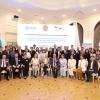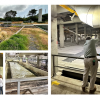News
Displaying Results 1 - 18 of 18
Mapping air pollutant emission sources in a country helps experts and decision-makers identify the most effective policies. Understanding the regional distribution of emissions is crucial for effective policy implementation.
Spatially allocating—or gridding—emissions is technically challenging.…
The 2024 UNECE Sustainable Development Goals (SDG) Progress Report shows that the UNECE region is far off-target when it comes to meeting commonly agreed SDG indicators. Spanning across Europe, North America, the Caucasus and Central Asia, Türkiye and Israel, the region is currently on track to…
The most senior statisticians of countries across and beyond the UNECE region meet in Geneva this week for the 72nd annual Plenary Session of the Conference of European Statisticians. Kicking off their deliberations, a shared session with UN-GGIM Europe, the United Nations’ European geospatial body…
This week the Conference of European Statisticians (CES) meets in Geneva for its 72nd Plenary Session. On the agenda: an in-depth look at how countries can move towards a holistic way of measuring economic activity, sustainability and wellbeing.
A high-level seminar on 20 June will give CES…
Responding to the request of the Governing Council of the United Nations Special Programme for the Economies of Central Asia (SPECA), UNECE is building the capacity of public and private experts in the SPECA participating States to use the semantic standards and reference data models of the UN…
Representatives from countries across Central Asia and experts on the climate and clean air came together in Astana, Kazakhstan this week (11-13 June 2024) for the Sub-Regional Workshop on Integrated Planning for Climate and Air organized by the UNEP-convened Climate and Clean Air Coalition (CCAC)…
Central Asia is well placed to produce fresh and dried fruit and vegetables. Countries like Kyrgyzstan, Tajikistan, and Uzbekistan are important producers of dried fruit, in particular apricots. However, traders from the region have been facing challenges with diversifying their export portfolios…
Mediterranean countries come together to increase climate resilience of water and sanitation sectors
The Mediterranean region is warming 20% faster than the global average and for every 1-degree global temperature increase, it would warm up by at least 1.5-2 degrees. This is severely impacting water and sanitation and the health and well-being of the region’s population. According to the World…
In a ground-breaking decision in December 2023, Parties to the UNECE Convention on Long-range Transboundary Air Pollution (Air Convention) agreed to revise the Protocol to Abate Acidification, Eutrophication and Ground-Level Ozone, as amended in 2012 (Gothenburg Protocol), which is expected to…
In an important move to secure the supply of essential raw materials, the European Critical Raw Materials Act (CRMA) entered into force on 23 May 2024. This legislation is a cornerstone in enhancing the EU's capabilities in sourcing, processing, and recycling critical raw materials (CRMs), which…
In North Macedonia, assisting households to make investments in green technologies not only supports climate action, but also helps them save on energy costs and improves living standards.
To support this aim, UNECE, UNDP, and IOM organized a Capacity Building Workshop in Skopje on the design of…
Addressing ministers at the 2024 International Transport Forum Summit (ITF24) in Leipzig, UNECE Executive Secretary Tatiana Molcean recalled that 152 United Nations Member States are contracting parties to at least one of the 61 transport conventions hosted by UNECE. These legal instruments help to…
Extreme weather events exacerbated by climate change increasingly threaten the ability of countries worldwide, including those in the UNECE region, to sustain safe, reliable, and equitable transport and mobility.
Adapting to future impacts of climate change is therefore no longer a concern to be…
In the face of global crises, progressing towards Sustainable Development Goal (SDG) 16—promoting peaceful, inclusive societies, justice for all, and accountable institutions—is a cross-cutting enabler for the 2030 Agenda. SDG16 intertwines with the other SDGs, underscoring the importance of…
In her opening remarks at the 8th edition of the UNECE International PPP Forum, UNECE Executive Secretary Tatiana Molcean emphasized the urgency of accelerating the implementation of the SDGs and climate action through sustainable Public-Private Partnerships (PPPs) and infrastructure finance. …
Risk is a part of our everyday lives. When we wear a helmet to ride a bike, for example, we accept a small inconvenience to reduce the risk of a fall or an accident. When a homeowner decides to retrofit their house, they incur a cost to shield against an earthquake or a flood. Faced with the COVID…
Every year we lose about 14% of the food produced before it is sold, and this does not even include the food never harvested. Even more is wasted at retail and consumer levels. At the same time, over 800 million people worldwide suffer from hunger, while food loss is a major contributor to CO2…
The world is urbanizing fast. Already today, half the population is living in cities. By 2050, that proportion is projected to rise to over two thirds. Cities are economic powerhouses, accounting for 80 percent of world GDP. They also have large ecological footprints, accounting for 60-80 percent…
















